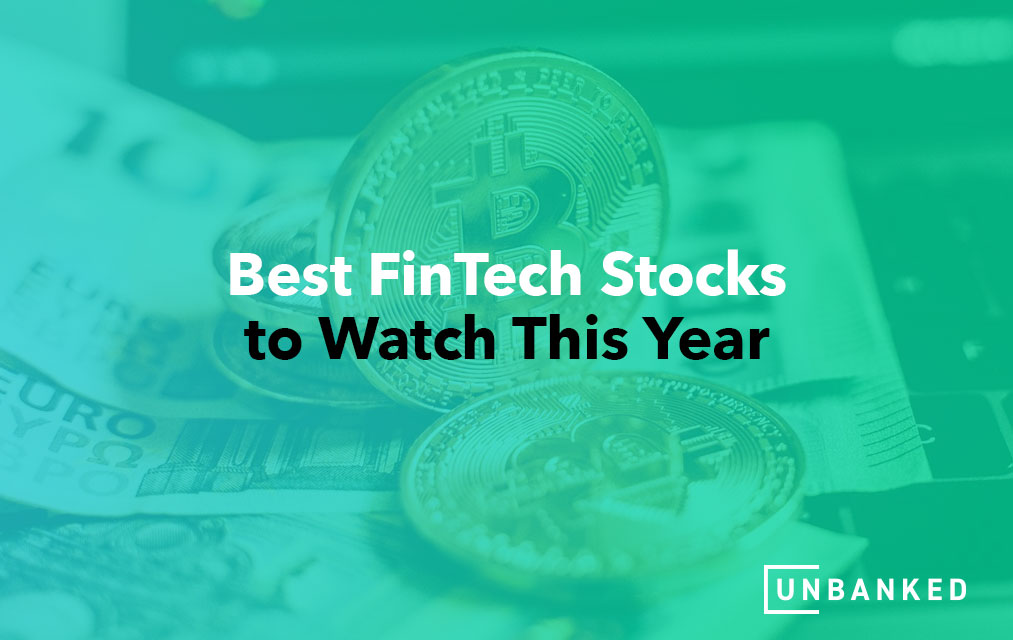Fintech stocks are becoming more popular than ever with investors worldwide. The shift toward a cashless, technology-based society is one of the driving factors of the growth of fintech companies and their rising stock prices. From fleshed-out financial and banking services to tools that help traditional financial institutions streamline their operations, 2021 was a great year to keep an eye on the fintech industry.
Fintech is disrupting the traditional banking industry. With the emergence of online wallets and cryptocurrencies, the future of financial services is trending towards cashless transactions. The leading fintech companies are utilizing tech to provide more reliable, faster services for everyday use—which is one of the most significant reasons why investors are on the lookout for the best fintech stocks to watch in 2022.
From online stock trading to P2P and online payment, the fintech industry is bringing the financial sector to the palm of consumers’ hands. Let’s get to it—Here are the five best fintech stocks you should be watching in 2022.
Related: How to Invest in Stocks
Upstart Holdings Inc. (UPST)
With personal loans gaining mass amounts of popularity in the last few years, Upstart is one of the companies thriving on that trend. For investors who may be unfamiliar with Upstart, the company is a leading online platform that uses artificial intelligence to streamline and automate the lending process. With Upstart, banks can give out personal loans while using non-traditional variables like employment and education to predict the customer’s creditworthiness. Through sophisticated machine learning methods, Upstart can accurately identify risk factors and approve more applicants over traditional lending models based almost solely on credit scores.
What’s even more impressive—Upstart is still a relatively new platform—is that it’s already achieved profitability. The company reported a $6 million net profit last year, meaning it’s one of the few fintech companies that are actually profitable. That being said, investing in Upstart has the potential to be extremely rewarding. By delivering lower fraud rates and more predictive underwriting methods, Upstart has the potential to continue to grow quickly. The company is set to see even more profit in 2021 due to its new platform that focuses on auto loans.
Paypal Holdings Inc. (PYPL)
Most people know Paypal for being a leading P2P payment platform, but this fintech giant is so much more. The Paypal network currently serves over 392 million customers and merchants worldwide. More recently, the company worked on forming new partnerships with global corporations and expanding its e-commerce services.
If anything, it seems like Paypal is gunning for the top spot in the fintech industry right now. Looking at its finances, the last quarter’s reports showed nothing but green across the board. Paypal’s year-over-year gains were exceptional—1,214% in earnings per share and 1,205% in net income. The company’s total revenue for the last quarter saw an over 30% increase, adding up to about $6 billion. Paired with the expansions to Paypal’s portfolio earlier this year, PYPL is looking to be a great investment for those interested in the fintech space.
Paysafe Ltd. (PSFE)
On the surface, Paysafe looks similar to Paypal and offers some of the same services. However, Payspace is a more specialized payment company. Its adoption of iGaming is what really separates the company from other digital payment providers. Many others looked at it as a risky industry niche to go into, but Paysafe viewed it as a unique opportunity. Now, its digital wallets are by far the most popular that get used in digital gambling worldwide. The company has seen a massive amount of growth in the first half of the year, and it shows no signs of stopping.
Despite seeing a relatively flat price movement, the company’s growth prospect is looking more and more bullish. As you may know, Paysafe recently announced a partnership with FOX Bet, and the company will now provide electronic cash products and digital wallets for the sports betting platform. It’s no secret that the iGaming sector looks attractive to prospective investors.
It’s also worth noting that Paysafe has some very notable clients, like Amazon’s Twitch and Bet365.
Square Inc. (SQ)
Square has been—and remains—one of the best fintech stocks available on the market. The company provides tools that empower businesses and individuals worldwide, making transactions streamlined and simple. It does so by combining software and hardware to turn mobile devices into powerful POS and payment solutions. Also, Square’s analytical tools help sellers make better overall business decisions. Namely, its solutions help sellers manage the financial aspects of their businesses using Square, including inventory, locations, customer engagement, and sales growth.
The company’s Cash App also brings in big rewards for its shareholders. Because millennials continue to adopt digital wallets at a pace never seen before, the company is seeing significant growth. In the first quarter, Square’s Cash App saw a huge gross profit surge—171% year-over-year—which adds up to around $495 million in revenue generated by over 35 million users. Square’s services are in a space to see potentially massive long-term growth.
SoFi Technologies Inc. (SOFI)
SoFi Technologies is a business- and consumer-facing industry disruptor that is quickly earning its place in the sector. It’s working on being the one and only one-stop shop for everything related to finance through its app. The platform allows for saving, spending, borrowing, investing, and protecting your funds all in a single application. Considering that most consumers use multiple financial institutions or apps to do all of these things, it’s becoming more apparent how many people may make the switch to SoFi’s solutions. If the company executes its plan correctly, it could be a lucrative investment.
Despite its stock seeing a recent downtrend, many investors believe that it’s a good time to buy while it’s currently showing some weak trends. One reason for this is because SoFi is currently expanding the services it offers, and its product is just starting to grow in popularity among users. During the past few months, the download volume of SoFi’s app has surged significantly. The company’s board of directors has seen some recent additions also, including Dick Costolo (the former Twitter CEO), Ruzwana Bashir (the founder and CEO of Peek.com), and Harvey Schwartz (the former Goldman Sachs president). While not as straightforward as the other four on this list, SoFi should definitely be on your watch list this year.
Looking for more companies that are disrupting the fintech sector? See how Unbanked is changing how people view financial institutions!
Other Fintech Stocks to Keep an Eye on in 2022

Now that we’ve talked about the top five fintech stocks to watch this year, here are some other ones that you might want to keep an eye on:
Goldman Sachs (GS)
You might not think of Goldman Sachs as a fintech company—in fact, most people would call it the opposite. However, the company is currently transitioning into a new business model and transforming from an investment bank for the 1% to a full-featured bank for all consumers. In 2019, the company expanded into the credit card sector, releasing the exclusive Apple credit card. Upcoming reports show that Goldman Sachs plans to offer checking accounts, additional investment platforms, and more.
The company is building its consumer business in a way that we can only describe as fintech. Unlike many other fintech companies, Goldman’s business tends to perform better in turbulent markets, making it a less cyclical fintech stock to consider.
Green Dot (GDOT)
Green Dot is one of the oldest fintech companies around and is best known for its prepaid debit card launch over twenty years ago. Its debit card business still makes up a significant portion of its profit, but companies like Square and Paypal are taking over market share by offering new, innovative solutions. However, GDOT has begun to capitalize on its one big advantage—the company has a banking charter. It’s making moves like offering savings accounts to Walmart Money Card customers and hiring a new, highly-experienced CEO to head the company’s banking efforts.
Companies like Uber, Apple, and Stash also use Green Dot’s BaaS—banking as a service— platform, and it’s continuing to grow in functionality and popularity. This service allows Green Dot to let companies offer banking products without actually being a bank themselves. You can think of it like this: GDOT allows other companies to use its banking infrastructure.
SEA LTD. (SE)
Sea Limited is a leading global consumer internet company that operates three core businesses in digital payments/financial services, e-commerce, and digital entertainment. They currently serve as the leading provider of financial services and digital payments in Southeast Asia. They have seen a continued strong growth trend, especially since their adoption of SeaMoney offerings. Over the last year alone, SE stocks have gone up by more than 130%, with more growth anticipated from several successful financial quarters.
The total GAAP revenue for their financial quarter reported back in August was $3.3 billion, indicating a massive increase of 158.6% year-over-year. Over half of this revenue was produced from the operations of its e-commerce business, Shopee, which brought in a GAAP revenue of $1.2 billion, up by 160.7% year-over-year. Shopee serves tens of millions of consumers in Southeast Asia daily and offers a massive range of products while supporting integrated payment methods and seamless fulfillment systems.
VISA INC. (V)
Visa is one of the most well-known global payment technology companies that’s operated for over half a century and currently holds a presence in more than 200 countries and territories. Its specialized financial services connect millions of businesses, banks, governments, and consumers around the globe every day, primarily due to its advanced global processing network, VisaNet. Said network facilitates its wide range of impressive fintech services, providing a reliable and secure payment method for use worldwide.In July, the company announced the completion of a definitive agreement to acquire Currencycloud. This massive global platform enables fintech companies and banks to offer innovative foreign exchange solutions via cross-border payments. Currencycloud already supports nearly 500 technology and banking clients in more than 180 countries, and its reach is predicted to continue expanding thanks to Visa. This significant acquisition will help the company grow its already existing strategic partnership between the two companies and the value of their collective services.
MercadoLibre (MELI)
If you haven’t heard of MercadoLibre, it’s known as the Amazon of Latin America. The company has a huge e-commerce business, and it’s growing at an impressive pace. The company’s payment platform is what’s really exciting from a fintech view—it processes billions in payments each quarter and continues to grow. MELI also recently partnered with Paypal. Between the new partnership and its controlling of the market share in Latin America means that the company’s growth might just be getting started.
Shopify (SHOP)
You can’t talk about fintech stocks without mentioning Shopify—the Canadian e-commerce platform that helped businesses worldwide make it through the pandemic. Most stock analysts like to recommend Shopify—out of the 41 who cover and track it, 25 list it as a definite buy, and another 14 rate it as a strong hold. Only two of the 41 recommend selling.
In July of last year, Shopify partnered with Affirm Holdings to offer its merchants a financing service known as “buy now, pay later.” Early this year, Shopify confirmed making about $350 million in investments in Stripe (the platform’s exclusive payment processor). Shopify has seen a growth rate of 222% over the past 27 months.
UP FINTECH HOLDING LTD. (TIGR)
UP Fintech is one of the leading online brokerage firms currently focusing on meeting the needs of global investors. Its impressive mobile and online trading platform has enabled investors to trade in a range of financial equities and other instruments on several exchanges worldwide by offering innovative products and services to consumers via their mobile-first strategies. Said strategies have enabled the company to better serve, retain, and attract new customers, causing the value of their stock to increase by more than 200% in the past year alone.
In early-mid September, the company released its second-quarter financial reports and listed its total revenue gains at $60.2 million, indicating a 98.7% increase from the previous year. The company has continued to invest itself in providing several services around user acquisitions, talent recruiting, and self-clearing solutions to facilitate the future growth of its business strategy success. The company also reported that they are continuing to see significant increases in the development of newly funded accounts, with more than 150,000 added in the second quarter of 2021 alone. These additional accounts caused their total account balance to reach $23.9 billion despite the current challenging conditions in the market, nearly tripling from last year.
Intuit (INTU)
Intuit is one of the oldest fintech stocks we’ll talk about. Founded in 1983, it went public in 1993 at $20 per share. An investment of $1,000 at its IPO is worth about $300,000 today, which includes three stock splits since becoming a public company. Intuit’s focus on technology over the last decade led to tremendous growth and popularity. In the past ten years, it went from having 29 million customers to 57 million, and the company plans to increase that number to over 200 million in the next four years.
Workday (WDAY)
Workday quickly became a must-have for CFOs of large organizations. WDAY provides enterprise cloud applications for human resources, financial management, spend management, planning, and analytics. In Q1, Workday reported a year-over-year increase of 15.4% to $1.2 billion with a non-GAAP profit of over $226 million—that’s 97.7% higher than the previous year. Because of its rapid growth in business, the company expects to generate almost four and a half billion USD from subscriptions in 2021.
FISERV (FISV)
Another fintech company to keep a close eye on going forward would be Fiserv, a primary provider of financial services, payments, and technology solutions operating through Financial Technology, Merchant Acceptance, and Payment and Networks. Like many other fintech companies this year, Fiserv stocks have been following a sideways growth, causing it to receive less attention from investors than more well-performing fintech stocks. That said, investors may want to take a second look at the company as we approach the start of 2022.
In November, Fiserv announced it had completed the final stages of acquiring BentoBox, an extensive marketing and commerce platform designed to deliver thriving service and accelerated growth to restaurants via a seamless guest experience. This acquisition intends to help further expand the company’s Clover dining solutions, which currently enable almost 200,000 restaurants to provide consumers with a unique diner experience. In addition to that, it’s also been announced that Australia’s Bank of Queensland is set to continue its technology modernization with a switch to cloud-based debit cards management through Fiserv.
MASTERCARD (MA)
Yet another famous fintech company that savvy investors should be on the watch for is Mastercard, a major company dedicated to connecting consumers, merchants, governments, businesses, and various financial institutions worldwide. They operate through electronic payment forms while also providing integrated offerings to consumers, such as consulting, reward programs, and information and analytics services. Mastercard recently announced that banks and merchants utilizing its services would soon be able to also offer crypto services to consumers, including bitcoin wallets and debit or credit cards that provide crypto rewards while permitting the sale of digital assets. This announcement is anticipated to potentially expand the ways people can earn and spend their crypto, which could massively raise the value of Mastercard stocks.
Coinbase Global (COIN)
COIN is a newer fintech stock player, making its appearance as a public company in mid-April. Coinbase is a large cryptocurrency exchange launched in 2012. It has about 56 million users—which is up from 32 million at the end of last year. Over 8,000 institutions are part of that user base. In mid-May, COIN saw a trading volume of about $335 billion, up from only $30 billion in the first quarter of 2020. Most experts attribute this growth to the rapid increase in Bitcoin’s price over the past year. As a result, Coinbase Global’s revenue and net income rose considerably.
Related: Cryptocurrency for Beginners
Want to learn more about cryptocurrency investing? Visit us at Unbanked!
UiPath (PATH)
UiPath, another newer company, gained over 23% on its first day of trading in April. Since then, it hasn’t done much—but that doesn’t mean it won’t. PATH’s a leading developer of RPA software and generates an average AVR of over $650 million from over 8,000 global customers. It’s likely for the demand for the company’s software and products to continue to grow over time. However, it’s difficult to say how long it will be—UiPath is currently losing money (based on GAAP) and may continue to do so for a while.

THE BOTTOM LINE
Any fintech stocks on this list could make for a solid long-term investment, but remember that what’s right for one investor might not be right for you. It’s important to perform your own research on the stocks you choose to invest in—if you want to learn more about investing, check out our free resources and guides.
Want to learn more about the financial benefits of cryptocurrency investing and what it can do for you? Visit us at Unbanked!





